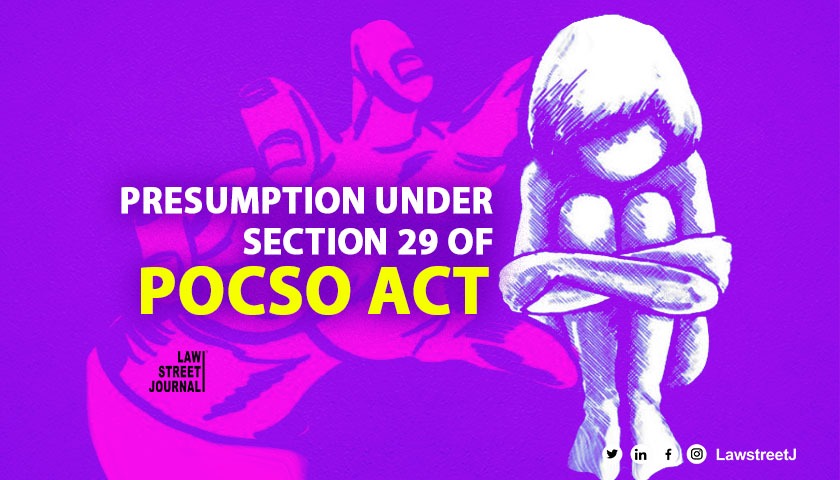NEW DELHI: The Delhi High Court has reiterated that for upholding the presumption of guilt under Section 29 of the Protection of Children from Sexual Offences Act, 2012 (POCSO Act), would operate only when the prosecution proves the foundational facts in the context of allegations against the accused beyond reasonable doubt.
Section 29 of the POCSO Act, 2012 provides that the Court shall presume that the accused has committed the offence of sexual assault against a minor which he is charged with, until the contrary is proved.
However, in the case at hand, the Court ruled that the presumption of guilt under Section 29 & 30 of POCSO Act taken by the learned Trial Court could not be an edifice to convict the appellant since testimony of victim is unreliable and there are serious flaws and gaps in the prosecution case.
Allowing an appeal in a POCSO Act case where the accused was the 12-year-old victims Chachis brother, the Delhi High Court set aside the conviction and sentencing of the accused person.
The bench of Justice Anoop Kumar Mendiratta reasoned that the victims case is marred by inadequacies and contradictions which strike to the root of the prosecution case and, as such, prosecution has failed to bring home the charge against the accused beyond reasonable doubt.
It further observed that, As a wrongful acquittal shakes the confidence of people, a wrongful conviction is far worse. A child abuser in the eventuality of false implication even continues to suffer a blot of social stigma which is much more painful than the rigours of a trial and imprisonment.
Therefore, it acquitted the accused-appellant and directed that he be released forthwith, if not required in any other case.
Facts of the case
The Delhi High Court was hearing an appeal preferred by the appellant/convict - i.e. the victims Chachis brother - under Section 374(2) of Code of Criminal Procedure, 1973 (Cr.P.C.) challenging the judgment and order on sentence passed by the Additional Sessions Judge, Special Court POCSO, New Delhi.
The appellant was booked in FIR No.529 of 2016 for offences alleged under Sections 376/ 354/ 506/ 509 IPC and Section 8/ 10 of the POCSO Act.
He was sentenced for the offence punishable under Section 10 of POCSO Act, 2012 to rigorous imprisonment for five years and a fine of Rs.2,000/-; for offence punishable under Section 506 IPC to rigorous imprisonment for five years and a fine of Rs.2000/- and further directed to pay a compensation of Rs.20,000/- to the victim.
The prosecutions version of the facts was that a written complaint was given by the victim about 12 years on September 16, 2016 stating that she was living with her grandmother, Chacha and Chachi since her biological father had expired, and her mother had left.
However, she alleged that the appellant Veerpal @ Titu who was the brother of her Chachi, used to visit their house and teach her wrong things.
She alleged that on September 10, 2016, when he came to their house, she went to meet him in her Chachis room and that when her Chachi went to the bathroom, the appellant started kissing her and pressed her chest. She somehow released herself from his clutches and ran away.
Thereafter she alleged that in the evening at the time of going to his house, the appellant threatened to kill her if she made any complaint against him. She remained upset for many days and disclosed the incident on being asked by her grandmother on September 16, 2016.
However, Court noted that the victims story had been changed and improvised after the first complaint to the effect that she changed the dates of when she informed her grandmother of the incident, and of the actual offending acts of the accused during her statement and cross-examination, revealing a new version each time.
Further, the Court also noted discrepancies between the grandmothers and the victims versions of what the victim had described to the grandmother.
It was also seen that the prosecution had made no reference to existing matrimonial disputes between the Chachi and the Chachi. The appellant had alleged that he was falsely implicated in the matter on account of animosity between the victims family, and the appellant - due to the matrimonial differences between his sister (the Chachi) and her husband (the Chacha).
Therefore, in the facts and circumstances of the case, and relying on the settled legal principles regarding child testimonies, the Court said that it had to bear in mind that the witness must be reliable, consistent and there is no likelihood of being tutored or under an influence.
Further, the version put forth has to be unassailable, trustworthy and of sterling quality, capable of holding appellant guilty on the basis of solitary evidence. As this was not the case in the present matter, the Court acquitted the accused Veerpal.







![Delhi High Court Sets Aside Arbitral Tribunal's Award Against NHAI in Highway Project Delay Case [Read Judgment]](/secure/uploads/2023/07/lj_9605_23374c2e-392c-4491-a2fe-f2f12fc5272f.jpg)
![Delhi Court Rejects Stay Request in Defamation Case Against Rajasthan CM Ashok Gehlot [Read Order]](/secure/uploads/2023/08/lj_5208_80de1ddc-d76a-4f7f-b180-408e3ae14fb4.jpg)







